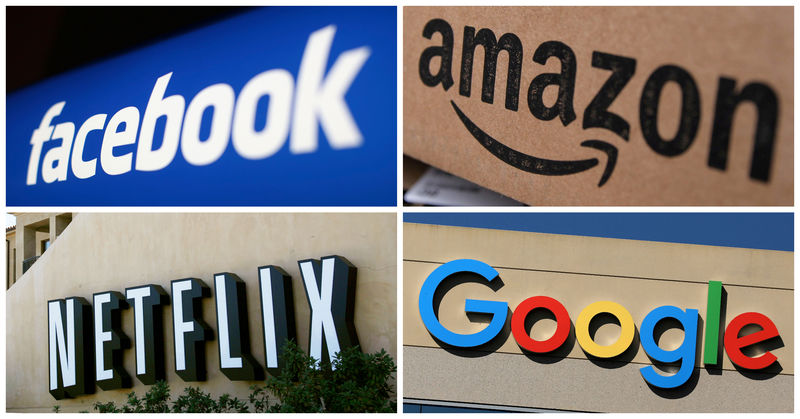Stock market today: S&P 500 rides Apple-led tech rally to close higher
(Bloomberg) -- A tax deal between the world’s richest countries brings global governments a step closer to clawing back some power from technology giants that have used century-old regimes to build up wealth eclipsing the economies of most nations.
While a weekend accord struck by Group of Seven finance ministers aims to close the net around all major multinationals, the tech industry is particularly adept at taking advantage of the current system. That’s because its main assets -- software code, patents and other intellectual property -- are relatively easy to maneuver compared to physical assets.
The result has been that the likes of Facebook Inc (NASDAQ:FB)., Amazon.com Inc (NASDAQ:AMZN). and Alphabet (NASDAQ:GOOGL) Inc.’s Google have paid effective tax rates which appeared on a long, steady march toward zero, much to the consternation of European governments in particular.
The Covid pandemic has reinforced those concerns as nations propped up workers and bricks-and-mortar firms, while big tech’s reach and wealth expanded with people in lockdowns turning to their services for shopping, entertainment, work and socialising. Without power to tax, governments may not only lack revenues to rebuild, but also the capacity to influence investment flows and economic development.
Analysis by Bloomberg Economics last month showed that the median tax rate for the world’s top 50 firms slumped from 35.5% in 1990 to 17.4% last year. Facebook (12.2%) and Amazon (11.8%) both paid below that rate in 2020.
Seeking to modernize practices for the digital age, G-7 finance ministers on Saturday agreed to push for a 15% minimum corporate tax worldwide and require large companies to pay more in countries where they do business, rather than just where they’re headquartered.
The pact sets the stage for talks in July by the broader Group of 20 countries and then discussions among some 140 nations under the auspices of the Organization for Economic Cooperation and Development. It would still be up to individual countries to pass laws to implement any agreement -- a challenge that would only get harder if Republicans in Congress push back against President Joe Biden’s program.
“Presumably, this means the end of global digital taxes, which is great for tech companies,” said Andrew Silverman, government analyst at Bloomberg Intelligence. “It also gives tech companies much more certainty, which is as valuable as lower tax rates -- companies can model out how the tax is going to impact them and do tax planning. It’s much harder to respond to a patchwork of digital taxes and tit-for-tat trade disputes.”
Tech firms welcomed the proposal for uniformity and less opacity after some governments, including France, the U.K., Italy and India, tired of the multilateral debate and unilaterally adopted digital taxes in recent years.
“Amazon welcomes the tax deal because applying random taxes in each country is unfair and wrong and it creates distortions,” Mariangela Marseglia, head of Amazon Italy and Spain, said on Monday. Facebook’s Global Affairs Vice President Nick Clegg said the agreement is a “significant first step toward certainty for business.”
Those companies have time yet to wait before any change takes effect. The G-7 deal left it unclear how the sequencing would work, with countries such as France insisting they won’t withdraw unilateral measures until they start getting income under a new regime.
Such dealmaking makes it clear that big tech’s tax bills are what governments ultimately want to raise, and that could be the case in all countries, including those that haven’t taken substitute measures on a national level.
Taxing Tech
While President Donald Trump’s administration resisted pressure to act amid concern American tech firms were being singled-out, current Treasury Secretary Janet Yellen concedes such businesses would “almost by any definition” be affected.
An October study by S&P Global (NYSE:SPGI) found that in 2019 Facebook was the only so-called FAANG company to pay an effective tax rate at or above the U.S. statutory 21% rate. Amazon paid 17%, half the amount of 2019, and Alphabet 13.3%. Netflix Inc (NASDAQ:NFLX). and Microsoft Corp (NASDAQ:MSFT). paid 9.5% and 10.2% respectively.For governments, such behavior leaves money on the table at a time when the coronavirus has forced them to run up huge budget deficits. The OECD calculated last year that the two-pillar change to tax policy could generate up to $80 billion a year for countries’ coffers. The latest proposals from the G-7 are likely to make that figure even bigger.
“After a four-year battle, France has succeeded,” said French Finance Minister Bruno Le Maire. “There will be a tax on digital giants. There will be a minimum corporate tax to avoid the evasion and optimization that revolts our citizens.”
Partly saving the tech companies from the American tax collector was their ability to hold more than $100 billion in profit outside the U.S. in the last fiscal year.
“A company that currently pays a lot of tax on its profits to the IRS will now pay a good bit more tax on its profit to countries in Europe,” said Daniel Bunn, vice president of global projects at the Tax Foundation, an independent tax policy group. “There’s going to need to be a whole new level of coordination between governments. This is going to turn this from two-dimensional chess into 3D pretty quickly.”Refreshing a century-old tax system across borders will also not be easy. Italian Finance Minister Daniele Franco warned that implementation will take “some years.”
“There’s still a great deal of uncertainty on whether this is going to happen at all and what the design of the tax actually looks like,” said Kyle Pomerleau, a resident fellow at the American Enterprise Institute. “The G-7 agreement is one step forward and definitely not a step backward, but I still think there’s a long way to go.”
©2021 Bloomberg L.P.
